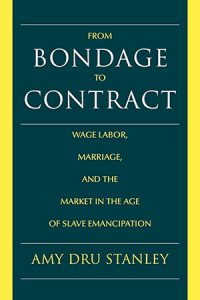From Bondage to Contract: Wage Labor, Marriage, and the Market in the Age of Slave Emancipation

Author: Amy Dru Stanley
Publisher: Cambridge University Press
Year of Publication: 1998
Print Length: 320 pages
Genre: Non-Fiction / History, Law
Area: The United States of America (USA)
Topic: Abolition, Labor & Contract, Slavery, Marriage, Politics & Power, Colonialism & Post-Colonialism, Poverty
In the era of slave emancipation no ideal of freedom had greater power than that of contract. The antislavery claim was that the negation of chattel status lay in the contracts of wage labor and marriage. Signifying self-ownership, volition, and reciprocal exchange among formally equal individuals, contract became the dominant metaphor for social relations and the very symbol of freedom.
This 1999 book explores how a generation of American thinkers and reformers – abolitionists, former slaves, feminists, labor advocates, jurists, moralists, and social scientists – drew on contract to condemn the evils of chattel slavery as well as to measure the virtues of free society. Their arguments over the meaning of slavery and freedom were grounded in changing circumstances of labor and home life on both sides of the Mason-Dixon line. At the heart of these arguments lay the problem of defining which realms of self and social existence could be rendered market commodities and which could not.
“Amy Dru Stanley’s From Bondage to Contract is a transformative reinterpretation of American public life in late nineteenth century America, a triumph of the historical imagination and a profound reflection on contractualism as a moral and political discourse. Stanley’s subject is contractualism at its moment of triumph, after slave emancipation. And her narrative explores points of tension and conflict in the moral universe in which ‘freedom of contract’ apparently reigned supreme: labor relations, marriage reform, begging and vagrancy, and prostitution. Her contractualism is never a conceptual monolith; From Bondage to Contract delineates many differing and competing contractualist reponses to the radically changed moral and economic universe that late nineteenth century Americans confronted.” Hendrik Hartog, Class of 1921 Bicentennial Professor of the History of American Law and Liberty at Princeton University
Table of Contents
Preface
Acknowledgments
1. Legends of Contract Freedom
2. The Labor Question and the Sale of Self
3. Beggars Can’t Be Choosers
4. The Testing Ground of Home Life
5. Wage Labor and Marriage Bonds
6. The Purchase of Women
Afterword
Index

Amy Dru Stanley is Associate Professor of History, Law, and the College at the University of Chicago. She is historian of the United States, with particular interest in law, capitalism, freedom and unfreedom, human rights, the relationship between the household and economic life, and the historical experience of moral problems. Her work has appeared in scholarly books and journals, as well as in the New York Times, the Washington Post, the Nation, Dissent, Slate, and Jacobin. She has received the Quantrell Award for Excellence in Undergraduate Teaching and the Faculty Award for Excellence in Graduate Teaching and Mentoring. In 2018, she was the jury chair for the Pulitzer Prize in history.
Source: https://history.uchicago.edu/directory/Amy-Dru-Stanley
More from Amy Dru Stanley in this library, click here.
